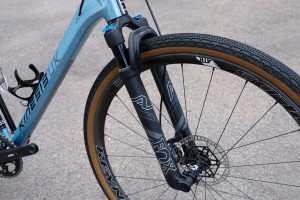The Manitou name may not have the resonance it once had but the brand’s reputation has culminated in a fork that’s not only the lightest enduro-specific option on the market but one that comes in as a total underdog. Offering a number of unique and easy-to-access features, the Mezzer Pro truly rubs shoulders with the best mountain bike forks.
- 9 tips to keep your suspension running sweeter for longer
- 2021 Fox Factory Series 36 Float 27.5 160 GRIP2 fork review
- How to set up your mountain bike suspension
Manitou Mezzer Pro fork - Technical details
The Mezzer Pro is the top-of-the-range enduro-focussed fork in Manitou’s line-up and, as well as its Reverse Arch design, there’s a handful of things that sets it apart from the competition. First off, it gets the Dorado air spring, the very same that’s on Manitou’s downhill fork, which is paired with the IRT (Infinite Rate Tune) volume adjuster that acts as a secondary positive air chamber.
This adjustment offers complete control over the fork’s midstroke support and progression towards bottoming out independently from the initial spring rate. What’s cool about this is that users can tune both the small-bump sensitivity and mid-stroke/bottom-out without influencing each other.
The self-equalising negative air spring eliminates a step of suspension set-up, as well as makes for a more supple feel, says Manitou.
At the other side of the fork, the sealed MC2 damper provides a range of blow-off thresholds with separate high and low-speed compression adjustments. There’s a single high-speed rebound adjustment. This sealed cartridge damper uses a bladder, similar to what’s found on RockShox Charger 2 and 2.1 dampers.
The fork is then built with 37mm stanchions which combined with the Hexlock SL2 axle and that reverse arch, delivers the fork’s stiffness.
It’s available in 140 to 180mm of travel and it’s internally adjustable in 10mm increments. There are a number of offsets available with the 650b fork coming with 37 and 44mm offsets, while the 29-inch version on test comes in either 44 or 51mm. It can then accommodate up to a 223mm brake rotor.
The Mezzer Pro is constructed from a forged aluminium hollow bore crown, with 7000-series butted wall aluminium lowers.
We’ve already touched on this fork’s market-leading weight and, at 2,100 grams with an uncut steerer, it brings the heat to other enduro-specific forks with Fox’s 38 Factory GRIP2 with 170mm of travel weighing 2,363g, and the RockShox ZEB Ultimate at 2,279g.
And while the Mezzer Pro can’t accommodate most mudguards, Manitou provides one that’ll fit perfectly in the box.
Manitou Mezzer Pro fork - Set-up
Despite the Mezzer Pro’s IRT adjustment that makes it rather unique compared to other enduro forks, it’s a very simple fork to set up. It’s just a case of inflating the IRT’s valve at the top chamber via the Shrader valve on the top of the left leg, and then the main positive chamber the IRT’s valve at the top.
This does make finding the sag without the help of Manitou’s recommended settings a little more difficult as the inflation or lack thereof does have an influence on the sag measurement. So these two chambers work in tandem to achieve correct sag. However, Manitou’s recommended settings aren’t far off, I’ve only upped the pressure on the IRT to help it better stand up in its travel.
But the benefit of the two positive air chambers outweighs the extra faff as you can quickly adjust the fork’s mid-stroke support and ramp up as you would with volume spacers or bottomless tokens. Though the real gem is that it can be done on the fly providing you’ve got a shock pump with you. With tokens or spacers, you’ll need specific tools and a pristine work area.
Compression and rebound adjustments are fairly straightforward with four clicks of high-speed compression making that tweak easy to find but in the ideal world, I’d like four more to act as a middle ground between the existing clicks. There were some occasions where I wanted just a bit of compression damping but not as much as what is offered by a single click.
There are then 10 clicks of low-speed compression and rebound adjustment. That may not be as many as other forks but it’s enough to offer a good range of adjustment without running the risk of getting lost amongst the clicks when setting up.
Manitou Mezzer Pro fork - Travel adjustment
A trick up the Mezzer’s sleeve is that the travel-adjust feature is very easy to access, though you will need some or at least one special tool: a cassette tool with a bit cut out.
Tools aside, the job is easy to get done. All that needs to happen is to remove the lowers (which can be done without losing any bath oil) and then use the special cassette tool to undo the threaded cap on the air spring side. Next up is to add or remove the included spacers as per the travel that you’re looking to achieve. It’s a ten-minute job that can be done by almost anyone who’s comfortable with general bike fettling (as long as you have that modified cassette tool).
It may not reach as much travel as the ZEB, for example, but with 140mm of travel, it's at home on a heavy-hitting trail bike.
What’s also cool is that the IRT can be adjusted with spacers, too, to make the stroke more linear, or progressive.
Manitou Mezzer Pro fork - Performance
During testing, the fork saw rock-strewn bike park trails, as well as more natural tracks and some smoother flow trails. Throughout all, the fork performed impeccably well.
Manitou’s work including the Dorado air spring and IRT is the real star of the show as these features do exactly what's required. During my very first ride with the Mezzer Pro, its masses of small-bump sensitivity really took me by surprise. Given the main chamber's low inflation pressure, it makes real sense.
This impressive small-bump sensitivity soaks up any and all low-level trail chatter as that low pressure reduces stiction and the overall breakaway force required to get the fork moving. It also keeps the front wheel gripping impressively, too, which resulted in a very predictable front end - especially when paired with the stiffness on offer.
As the fork moves towards the midstroke, that’s where the IRT chamber comes into play, and the higher pressure provides support and bottom-out resistance. During my time with the fork, I played with this pressure quite a bit to see how much of a difference +/- 10psi would make, and the contrast is stark. Less pressure means a more linear fork, and more adds progression, which is helpful through rough sections and when absorbing bigger hits. The fact that this can be done on-the-fly is a surprisingly valuable feature.
The quality of the fork’s travel is definitely on par with fat-stanchioned offerings from Fox and RockShox. That MC2 damper dampens the travel beautifully, resulting in a smooth action that does little to detract from a bike’s overall ride quality.
Stiffness provided by the fork it’s too shabby either. It’s certainly comparable to the 38mm stanchioned forks on the market but instead of relying solely on fat tubes, a lot of the fork’s stiffness comes from the overbuilt rearward arch. This helps keep the front wheel tracking true through questionably lumpy sections, boosting confidence. I never noticed any flex under load when cornering either.
I ran the rebound a couple of clicks from totally open which kept the fork plush and comfortable but also responsive - I also added a few clicks of low-speed compression. Overall, I’ve been super happy with the fork’s performance and I’ve felt very little compromise having moved from a Fox 36 Performance Elite fork with a GRIP2 damper.
But if I were to really hunt for faults, the included mudguard isn’t the best around. It has kept the worst of the flung crud out of my face but it’s simply not as effective as others on the market.
Manitou Mezzer Pro fork - Verdict
The Manitou Mezzer Pro fork impresses both in performance and value stakes. At £1,100 you’re getting a top-of-the-range fork with unique adjustments at a weight that’s yet to be achieved by the bigger names in the game.
Fox’s 38 Factory GRIP2 is a mainstay in the enduro fork market, being the first to bring big stanchioned stiffness to the segment At £1,350 it’s one of the pricier options on the market, (ignoring fancy boutique brands) but it’s also weightier at 2,363g.
Though the RockShox ZEB Ultimate comes at only £20 more than the Mezzer Pro. For that, you’re getting some cool features in the form of the Buttercups, lengthy bushing overlap, SKF seals as standard and the latest Charger 3 damper. Though this fork is heavier again.
If you’re looking for big performance but want to save a bit of cash against the bigger brands, the Manitou Mezzer Pro is a serious contender. It’s the lightest fork in its class but it combines a level of stiffness and small-bump sensitivity that makes it a seriously attractive fork for the money. That’s ignoring the IRT tech that allows for tonnes of adjustment in the fork’s progression. Compromises are very few but you’ll have to put up with the not-so-ideal mudguard.


















Add comment